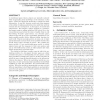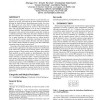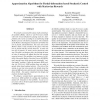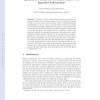49 search results - page 6 / 10 » Game theoretic Golog under partial observability |
SIGECOM
2006
ACM
14 years 2 months ago
2006
ACM
In traditional game theory, players are typically endowed with exogenously given knowledge of the structure of the game—either full omniscient knowledge or partial but fixed in...
CSR
2007
Springer
14 years 2 months ago
2007
Springer
In this paper, we consider the decidability of two problems related to information flow in a system with respect to some property. A flow occurs in a system if the conditional pr...
ATAL
2010
Springer
13 years 9 months ago
2010
Springer
There has been significant recent interest in game theoretic approaches to security, with much of the recent research focused on utilizing the leader-follower Stackelberg game mod...
FOCS
2007
IEEE
14 years 2 months ago
2007
IEEE
We consider a variant of the classic multi-armed bandit problem (MAB), which we call FEEDBACK MAB, where the reward obtained by playing each of n independent arms varies according...
ICALP
2009
Springer
14 years 3 months ago
2009
Springer
Abstract. We study a model of games that combines concurrency, imperfect information and stochastic aspects. Those are finite states games in which, at each round, the two players...




